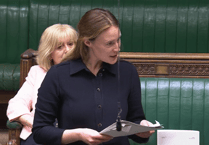IF there’s one phrase I can’t stand, it’s: “Because we’ve always done it that way,” -and nowhere does that apply more than in relation to the operation of bus services in Cornwall.
For far too long, there’s been a begrudging acceptance that late, cancelled, unreasonably slow or poorly timetabled services is just part of life in Cornwall and that public transport shouldn’t be the obvious choice; it’s just an unavoidable chore.
So, I am proud to support real investment and change to a franchising model which puts the public’s priorities first, announced last week by our Labour Government.
For many people, good bus services are essential for accessing jobs and healthcare, or avoiding social isolation. But every week, constituents tell me of unreliable and reduced services causing undue hassle – such as the Newquay to Bodmin service taking two hours, waits of two hours between buses from St Dennis to Newquay and St Austell, cutbacks to the 26 bus service highlighted by many residents in Roche, and some services like the 21 seeing cancellations.
Others tell me that the infrastructure that is unfit for purpose with no shelters, or missing and out-of-date timetables – including several between St Austell and Trewoon.
I’ve been listening – launching two surveys on transport connectivity; one in more rural areas including St Dennis which also explored western clay country residents' appetite for an expanded branch line rail network, and one wider national poll.
So, I was pleased to see last week that Government is responding; providing funding to Cornwall Council for a pilot scheme to see how a fuller franchising model, rather than just the “enhanced partnerships” we’ve had with operators to date, could improve connectivity, boost passenger satisfaction, and support local rural communities.
The aim is to is to help the transport authority navigate the franchising process effectively - gathering intelligence about different options and identifying the most effective approach to managing bus services in each area before proposing strategically thought-out routes, rather than the “anything goes” (but often doesn’t go at all) system we have now.
More widely, this Labour Government has confirmed over £1-billion of funding to support and improve bus services in England and to keep fares affordable.
We are also progressing the Bus Services Bill – which aims to put power over local services back in the hands of local leaders and transport authorities - the people best placed to make decisions about how to improve local services. This includes access to employment, jobs, health facilities and education. It is about enabling more people to use buses, ensuring that services are safer, more reliable and more accessible, and about harnessing the best of devolution.
This Bill also removes the ban on establishing new local authority bus companies. By giving authorities the power to create and pay bus operator grants in their area, it gives greater protections for socially necessary services, securing the lifeline routes that keep communities connected.
It will also require local authorities to produce a bus network accessibility plan and to consult disability organisations on changes to services.
Public transport in Cornwall needs to be made an obvious choice, not a chore. For that, we need a strategic approach which puts the public good, not private profit first, ensuring decisions on routes aren't just made in a vacuum with no consideration for the bigger picture.
Thanks to new legislation and funding, from this government, we can take a fresh look at where we are now with the public good, not private profit as the first priority, and have a proper strategy for improving services going forward.





Comments
This article has no comments yet. Be the first to leave a comment.